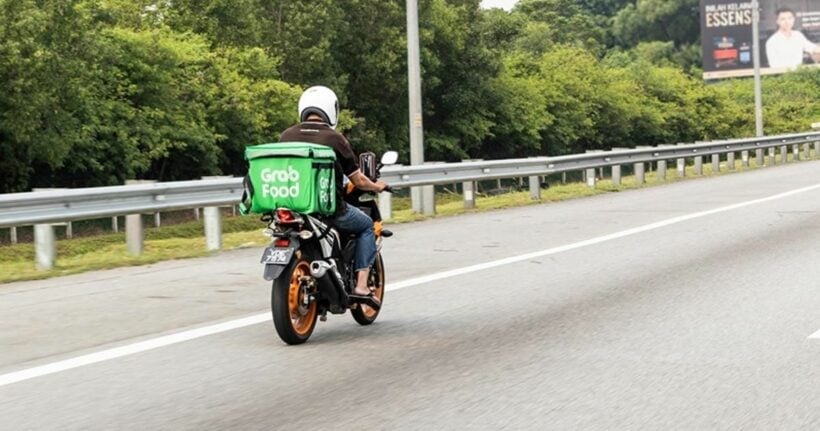Bangkok food delivery riders demand legal protections

If you’ve got a smartphone, a motorbike and a bit of cash, you can get work straightaway in Bangkok… but it comes at a cost. Though the income is potentially high, online food delivery drivers face heavy workloads, long hours, customer complaints and high levels of risk.
GrabFood riders held a protest in Bangkok last week, saying that they get too small a cut from the company. Some claimed to be paid as little as 30 baht per delivery.
Even if some services pay more, the protesters say their take-home pay ultimately isn’t much, as they must spend their own money on food and drinks as they wait, often for hours, for an order to come through, and companies don’t cover insurance or vehicle maintenance.
The key players in the sector at the moment are Line, GrabTaxi, Foodpanda and Gojek. All of these companies make a profit by paying a fee to drivers, who serve as a missing link between customers who can’t (or won’t) leave their homes and local restaurants and food stalls.
Riders and customers are matched with smartphone applications with which consumers can place orders at their chosen eateries. The apps notify customers when a rider agrees to collect the food for delivery to their address. Customers can use the apps to track the progress of their orders.
But while the apps are convenient for customers, the convenience comes at a cost for riders, who often have to deal with “unkind” conditions.
One rider who asked not to be named said delivery service providers apply a points-based appraisal system which gives extra points to drivers who promptly accept and deliver orders. These points supposedly reflect a driver’s performance. Customers are sometimes charged a delivery fee, which differs from one app to another, or pay higher prices compared to walk-in customers.
The rider said his take-home pay depends on what kind of orders he gets. Some days, he waits hours for a single order at a busy restaurant.
“I could have delivered two or three orders from other restaurants in that time.”
Problems usually begin during “peak hours,” the lunch rush 10am to 2pm on weekdays, when delivery apps are flooded with orders from office workers. And a rider who declines orders can be barred from logging onto the app.
“Because of the demerit system, no one would dare to reject an order even if it’s inconvenient. It’s extremely exhausting, but sometimes we don’t have a choice.”
The rider says he’s 16-18 hours a day since New Year’s Day, bringing home an average of 16,000 baht a week, but while his previous job didn’t pay as well, at least he could spend the weekend with his children.
Customer dissatisfaction can also hit riders’ wallets. If a customer feels they’ve waited too long or simply changes their mind, they can easily cancel their order on the app.
“In these cases, we sometimes have to pick up the tabs ourselves. Riders have to pay for the food orders with their own money and have it ‘reimbursed’ by the customers.” Another rider agreed and added another common complaint:
“We often get scolded by angry customers.”
Female riders face added risks. One complained on Facebook, saying she rode 17 kilometres to deliver an order at 1am, only to have the delivery address changed to a location that required her to go even further, down a deserted, dusty road. When she arrived, no customer came out to receive the order.
“Aye” became a food delivery rider because of the potential for high pay it promised. At first, he earned 100 baht per delivery, but nowadays days he gets about 40 baht for deliveries within a 5 kilometre radius, or about 1,200 baht a day – just enough to support his wife and seven year old daughter. He says there are about 100,000 people working as food delivery riders in Bangkok.
“Anyone with a smartphone, a motorcycle and a bit of cash can get work straight away. But the companies don’t cover vehicle maintenance, and they don’t provide insurance in case of accidents.”
Aye called on the government to require companies to provide some benefits for riders, including insurance coverage at the very least.
One law researcher at Chiang Mai University says companies behind food delivery apps control a huge amount of data about consumer behaviour, which can be sold to business analysts.
“Riders play a crucial part in collecting this data and they deserve to receive a share of the income from any sale of the information.”
Yet while riders’ work exposes them to constant danger from road accidents they aren’t eligible for compensation from the companies or the state because they are not technically company employees.
Kriangsak Teerakowitkajorn, a researcher with the Just Economy and Labour Institute, agreed.
“These food delivery workers have no negotiating power at all when it comes to labour rights.”
App-based food delivery services operated by so-called platform economy companies have fast gained popularity over the past two years. The industry’s value is expected grow to between 33 and 35 billion baht this year, and to continue at around 10% per year.
SOURCE: Bangkok Post
Latest Thailand News
Follow The Thaiger on Google News:


























